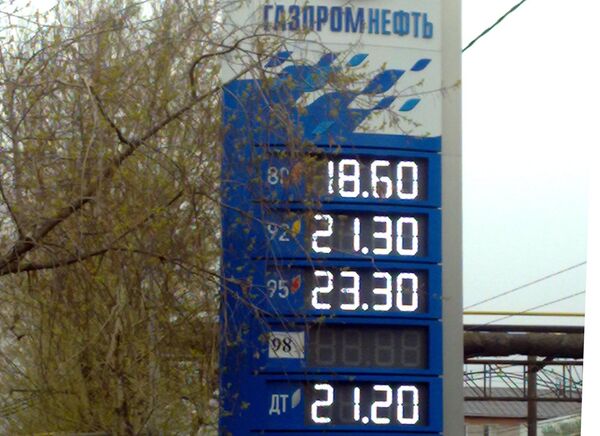The shortage of gasoline that started in Russia over the weekend persisted across the country on Wednesday with prices rising in regions where fuel is still left, business and government officials said.
In the Siberian city of Tomsk a fifth of buses failed to run for lack of fuel or its high cost.
"On Tuesday evening many minibuses could not get fuel," a transport firm official told RIA Novosti. "In the morning there were long lines at filling stations and only 25 liters per bus were sold, while a PAZ bus needs 80-100 liters a day. This is why the morning schedules were disrupted."
On Wednesday, prices for gasoline at Tomsk filling stations rose 16 percent compared to the previous day. In Irkutsk, also in Siberia, prices increased up to 50 kopecks per liter of gasoline (around 2%).
Gasoline shortages started in the Altai region in southern Siberia last weekend, where most filling stations not belonging to major oil companies ceased working because of a lack of fuel.
The Prosecutor's Office started three court cases against Russia's top oil firm Rosneft and Gazprom Neft, Gazprom's oil division, because some of their Altai filling stations did not sell fuel, while others only sold it to holders of special cards.
Gazprom Neft said it had sent an additional 5,000 tons of fuel to the Altai region, exceeding last April's supplies by almost 35 percent.
Novosibirsk region Governor Vasily Yurchenko said there were disruptions in supplies to the region because Rosneft had failed to fulfil all its obligations. He said the region's core supplier Gazprom Neft had agreed to deliver an additional 30,000 tons.
In Murmansk, in the north-west of Russia, Rosneft stopped selling gasoline to individuals and the regional administration sent a telegram to Energy Minister Sergei Shmatko to ensure supplies of fuel for governmental needs.
Analysts say oil companies are reluctant to sell fuel locally, because international prices are rising whilst the government keeps a tight lid on fuel prices ahead of parliamentary elections in December and the presidential poll in March. The Federal Antimonopoly Service says it suspects a cartel agreement between the big oil firms. Prime Minister Vladimir Putin ordered the government on Tuesday to report on the reasons for the deficit.
The situation has been exacerbated by the fact that the sowing season is near, prompting strong demand for diesel for agricultural vehicles like tractors. Russia desperately needs a good harvest this year if it wants to hit the government's inflation target of 6-7 percent and lift the grain export ban it introduced after last year's unprecedented drought.
Finance Minister Alexei Kudrin, who represents the liberal wing of the government, said the root of the problem was in regulating the industry.
"The factors ... in some regions are exclusively tied to administration and regulation of business," he said.
MOSCOW, April 27 (RIA Novosti)


